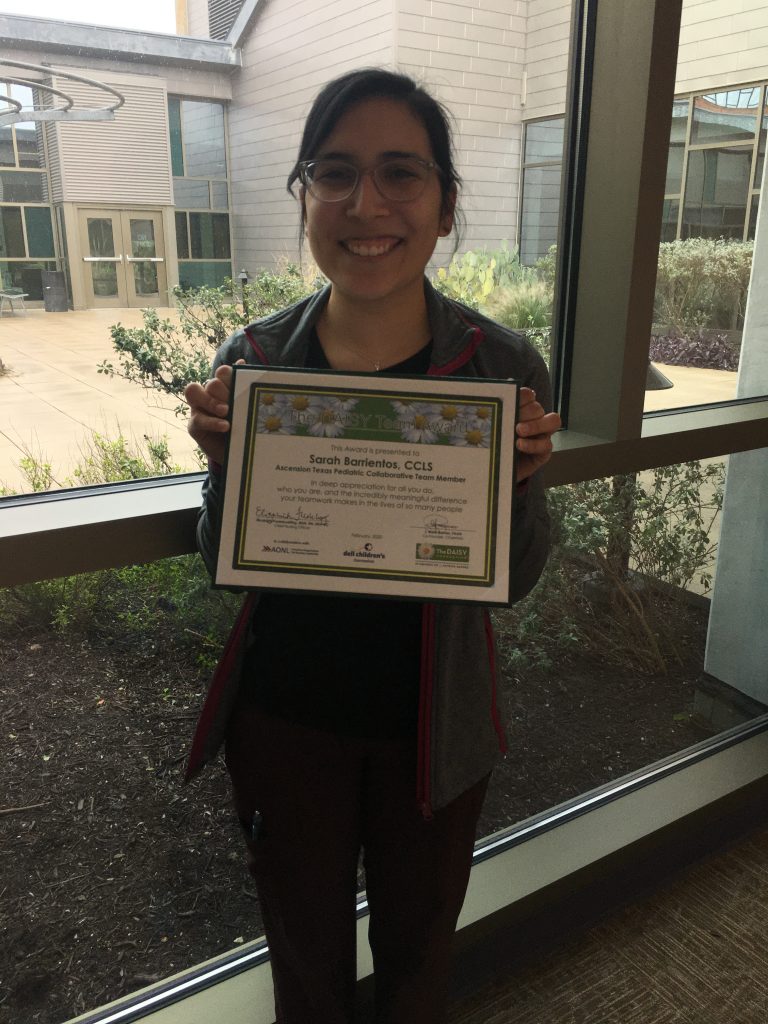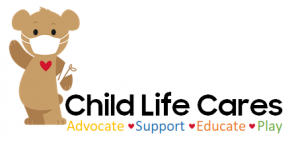By Sarah Barrientos, MS, CCLS
Published in ACLP Bulletin Winter 2020 | Vol. 38 No. 1
In the fall of 2018, as graduation neared, the daunting task of completing job applications weighed heavy on my mind. If you’re like me, you’ve heard it a million times . . . “Take whatever you can get,” “This is a competitive field,” “Don’t be too picky; you can always move to your preferred unit later.” I was determined to fulfill my dream of being a child life specialist, so I applied for every opening I found. When I was offered a position in my hometown, I was ecstatic! I accepted the offer and started my first job as a PRN child life specialist. As the medical abbreviation “PRN” implies, I would work “as needed.” I wouldn’t have a specific role in the hospital, but would act as a backup child life specialist, providing coverage in any area of the hospital on days that the department required additional support. There was a lot that I loved about my role, but as with any job, there were some challenging aspects as well. If I had known then what I know now, I think I would have felt better prepared for some of the challenges I faced. My hope is that by sharing the ups and downs of my experience, perhaps I can offer some guidance and insight to help prepare new child life specialists who are considering traveling down the PRN path.
Perks
What first caught my attention about the PRN role was the leisure of having a flexible schedule, and it was undoubtedly one of my favorite parts. It allowed me the time to adjust to life in the hospital while still having time to engage in other jobs and activities that I enjoy. I was also able to plan vacations without having to worry about requesting time off. My schedule looked different from week to week and I loved it. This flexibility made for a good work/life balance; I was afforded the luxury of planning my job around my life instead of planning my life around my job.
Being PRN also meant having flexibility within the hospital, as I worked on many different units. Throughout my time, I provided coverage in the ER, the acute respiratory unit, inpatient rehab, the NICU, hematology/oncology, and various clinics. As a new child life specialist, this was a great opportunity that allowed me to explore different areas and gain a variable skillset. When I graduated from college, I wasn’t sure which units I preferred, and working PRN allowed me to get a little taste of everything. I was able to learn what I liked and what I didn’t, what came naturally to me and where I needed to build my skills. I’ve learned that I love the fast pace of the ER but yearn for the long term therapeutic relationships often built on inpatient units. I also learned that although I feel confident in my procedural preparation and support skills, knowing all of the assessment questions to ask is an area that I’ve had to continually develop.
With the ever-changing rotation of units, I was kept on my toes as I was consistently learning something new. I not only grew professionally, but also personally, as being PRN pushed me to explore and to become comfortable with being uncomfortable. On any day that might have been particularly difficult, I was often gifted a breath of relief as I remembered that sooner rather than later, I would be given a day of rest or floated to another unit where I could start over and try again. My role as PRN specialist taught me a lot about my own resilience and my own ability to persevere as it pushed me to believe in my skills and my knowledge. I gained a lot of valuable insights. Some of this insight came to me with ease and some of it was acquired with a bit more difficulty.

Challenges
Despite the flexibility of working PRN, I began to feel a lack of connection with the interdisciplinary team. Because I was constantly moving between units, it was hard to build rapport with staff. As I finally started to get comfortable with one team, the nature of my role had me transitioning to another unit and back to square one. This was particularly difficult for me as it takes me a while to feel comfortable with new people and new situations. Feeling like I was constantly starting over was a bit discouraging at times. I wanted to gain a sense of belonging, but the very nature of my role made it nearly impossible. My inconsistent presence at the hospital also make it hard to feel like a part of my own child life team. Because I wasn’t present for daily huddles, lunches, meetings, and staff development, I missed out on the quality time it takes to build relationships. When I was working and able to attend these events, I felt like a stranger. Without the consistency to help me feel comfortable, I found that the more days I had off between shifts, the harder it was and more distant I felt.
The lack of consistency also impacted my confidence in my skills and knowledge. While frequently shifting between units and trying to soak it all in, it was difficult for me to build a sense of competence within any one area. Instead of feeling like I knew a lot about a certain diagnosis, procedure, or population, I felt like I knew just a little about a lot of them. While I clearly realize now that it was an unrealistic goal, I wanted to be an expert in something — anything. I wanted to know the ins and outs and hold the confidence of a child life specialist who had been doing this work for years. I struggled between the high of knowing information about many different topics and the low of realizing that my knowledge only went so far.
Challenges also manifested themselves outside of direct patient care as I became aware of the restraints put on my role at the policy level. For example, PTO and health benefits weren’t a part of my job package. However, at that point in my life, these weren’t huge sacrifices. That being said, I would encourage anyone considering this role to think about how these factors might impact them. When I think about my overall experience as a PRN child life specialists, the thing that I struggled with above all else was the inability to give more. I wanted to engage in a deeper commitment to my role by participating in hospital, unit, and department committees set on making changes to positively impact those we serve. The PRN role makes this difficult when you cannot promise your presence.
Go For It!
I learned a lot of valuable lessons working as a PRN child life specialist, lessons that taught me about myself, helped me to build my confidence in my skills, and motivated me to continue moving forward. I was able to slowly dip my toes into child life work without jumping in headfirst and was given the freedom to explore. Looking back know, the flexibility of this role was its greatest gift. When a full-time job finally became available to me, my PRN experience gave me the courage to confidently say, “Yes, I am ready. This is the area where I want to work.”
Although the challenges were hard to swallow at times, I don’t share them with you to deter you from pursuing child life work on a PRN basis. I think it can be a great option for individuals starting out in this field. I felt it was important to be open and honest about the challenges of this role, while also highlighting the perks. My hope is that my insight can offer some preparation as you contemplate whether working PRN is the right choice for you. After all, as we all know, coping is made easier with a little preparation.


